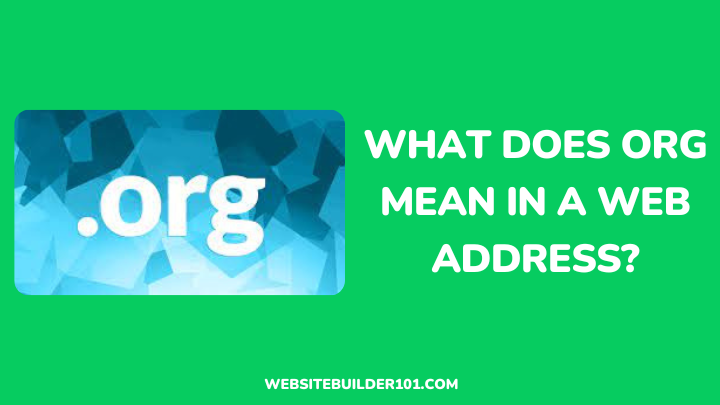When discussing a web address, you may have noticed many ends with .org, .net, or .com. Well, they are top-level domains (TLDs).
Their main purpose is to help users, including your potential customers, identify the type of website that they are visiting.
So far, the most common TLDs on the internet are .org, .net, and .com, and in this guide, I’ll explain each one. Read on to learn more.
What is a web address?
A web address, or URL (Uniform Resource Locator), is a resource on the World Wide Web that specifies its location and an easy way for users to locate it.
It consists of four main parts: protocol, domain name, path, and fragment identifier.
While the domain name identifies the website or web server that contains it, the path indicates where the file resides in the server’s directory structure. And finally, the fragment identifier allows users to navigate to particular sections of the page.
Each part of a web address is separated by a forward slash character (/) and may include valid characters such as letters, numbers, hyphens (-), underscores (_), and periods (.).
URLs are essential technology that allows you to access and navigate the internet.
You can use them to access websites or files on servers from anywhere in the world.
What does .org mean in a web address?

Org means “organization.”
It is one of the top-level domains that non-profit organizations or government bodies use for their websites.
Some well-known websites with an org domain include Wikipedia (wikipedia.org), The World Wide Web Consortium (w3.org), and Internet Archive (archive.org).
The .org domain has been used since 1985 and is one of the most popular top-level domains, alongside .com, .net, and .edu.
What does net mean in a web address?
Net means Network.
Net is a top-level domain (TLD) used in the Domain Name System (DNS) of the Internet. It is one of the earliest TLDs.
And the reason for it is so that organizations involved with networking technology, such as internet service providers can have a domain that reflects their niche.
Today, the domain extension is available to the public.
For example, you may see websites with URLs such as https://www.mycompanyname.net instead of the more common .com TLD. While this URL type is not as popular as it used to be, you will still find it on many websites.
The .net TLD is managed by VeriSign, and registrations are done through accredited registrars. If you’re looking to register a domain name, make sure you check the availability of the .net version, as well as any other relevant TLDs.
What does .com mean in a web address?
Com means “commercial.” And is the most widely used top-level domain (TLD) extension.
It signifies that the website in question is a commercial entity. This can include a company or organization, rather than an educational institution (such as .edu), a government website (.gov), or a non-profit organization (.org).
As I said before, it is one of the most recognizable TLDs, and many users assume that any website ending in .com is a legitimate business.
Websites with this extension are also easy to remember, which makes them popular with businesses that want their customers to be able to find them quickly and easily.
However, a large number of websites using this extension can make it difficult to stand out from the crowd.
Luckily, there are many other domain extensions like .io, .ca, .net, .co, etc to choose from if you want to distinguish your web address.
Which is a better web address, .org, .net, or .com?
It depends on the purpose of your website. If you are creating a site for a non-profit organization or government entity, then .org is the better option as it is associated with organizations.
If you are running a business or setting up an online shop, then .com is the best choice. This is because, by default, it is associated with commercial websites.
On the other hand, if you are setting up a website for networking purposes or as an informational site, then .net could be the better option.
While there are these differences between .org, .net, and .com domains, you can register all three through most domain registrars. However, the cost of registering and renewing these domains may differ depending on the registrar.
FAQs
Is .net a good domain?
Yes, it is. .Net is an excellent choice for developers who create a website or application with a professional look and feel.
Does .org mean it’s safe?
The answer is no. The .org domain may be a sign of legitimacy, but it does not guarantee that the website is safe. So always use caution when browsing any website, even one with a .org domain.
Is a .net website reliable?
Yes, it can be. Websites that use .net web addresses can be reliable. But it’s always good to cross-check whatever information you find on them with other sources. The reason is that the .net extension is available to the public, including fraudsters.
Conclusion
The org net com in a web address indicates the type of domain the website operates on. As a quick recap, the .org domain indicates a non-profit organization. The .net domain implies a network provider or service company, and the .com domain denotes a commercial entity.
One thing that is constant is that these three-letter suffixes are an important part of web addressing. And they help to give a website its identity.
With this information, you now know what type of service or organization a particular website belongs to. And you can make informed decisions when choosing which site to visit.
Also, when it’s time to acquire a domain name for your website, you’ll be able to easily choose the best one for you.
Thanks for reading.
Want to learn more about domains? Check WebsiteBuilder101 for similar guides.
